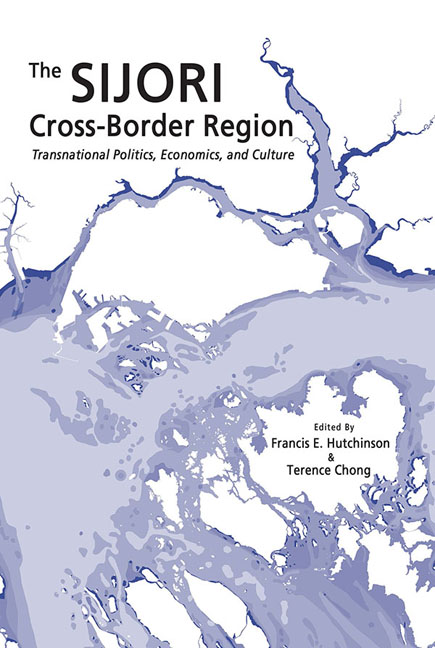Book contents
- Frontmatter
- Contents
- List of Maps
- List of Tables
- List of Figures
- Foreword
- Acknowledgements
- Contributors
- Abbreviations
- Introduction
- Section I Understanding the Whole
- Section II Policy and Politics
- Section III Cross-Border Social and Cultural Communities
- Map4
- 9 The Significance of Riau in SIJORI
- 10 Singaporeans Living in Johor and Batam: Next-Door Transnationalism Living and Border Anxiety
- 11 Singapore Malay Family Businesses: Negotiating Malaysian and Singapore Citizenship and National Identities
- 12 Imaginary Frontiers and Deferred Masculinity: Singapore Working-Class Men in Batam
- Section IV Formal and Informal Economies
- Conclusion
- Appendix
- Sources for the SIJORI Maps
- Index
9 - The Significance of Riau in SIJORI
from Section III - Cross-Border Social and Cultural Communities
Published online by Cambridge University Press: 22 July 2017
- Frontmatter
- Contents
- List of Maps
- List of Tables
- List of Figures
- Foreword
- Acknowledgements
- Contributors
- Abbreviations
- Introduction
- Section I Understanding the Whole
- Section II Policy and Politics
- Section III Cross-Border Social and Cultural Communities
- Map4
- 9 The Significance of Riau in SIJORI
- 10 Singaporeans Living in Johor and Batam: Next-Door Transnationalism Living and Border Anxiety
- 11 Singapore Malay Family Businesses: Negotiating Malaysian and Singapore Citizenship and National Identities
- 12 Imaginary Frontiers and Deferred Masculinity: Singapore Working-Class Men in Batam
- Section IV Formal and Informal Economies
- Conclusion
- Appendix
- Sources for the SIJORI Maps
- Index
Summary
INTRODUCTION
The acronym “SIJORI” refers to an economic zone made up of parts of three nationstates. Singapore, Johor (a state in Malaysia, which comprises the southernmost part of the Malay Peninsula), and Riau (since 2004 comprising two provinces in Indonesia — namely, Kepulauan Riau, and Riau, which previously constituted one province).
From a historical perspective, these three parts of what are now separate nationstates previously belonged to the Johor-Riau kingdom. There is thus discontinuity between geographical territory (in terms of geographical coordinates of latitude and longitude) and political territory (in terms of nation-state sovereignty). This discontinuity is significant because SIJORI as an economic zone has been established, not in a tabula rasa, but in a historically constituted territory that refers to a bygone Johor-Riau kingdom and that is currently divided into three nation-states. This chapter first discusses the geographical territory referred to as Riau in the political context of the Johor-Riau kingdom, followed by a consideration of the implications of the past for the present.
The name “Riau” is currently used for two provinces in Indonesia — Propinsi Riau and Propinsi Kepulauan Riau. Propinsi Riau, generally referred to as Riau, shares borders with four other provinces — Sumatera Utara to the north, Jambi to the south, Sumatera Barat to the west, and Kepulauan Riau to the east. Propinsi Riau also shares part of the Straits of Malacca with Malaysia. In contrast, Propinsi Kepulauan Riau — or Province of the Riau Islands (PRI) — is a widely dispersed archipelago located in the South China Sea, with Vietnam and Cambodia to the north, Singapore and the Malay Peninsula of Malaysia to the west, as well as Sabah and Sarawak of Malaysia to the east. It abuts only two other Indonesian provinces — Sumatera Selatan to the south and Propinsi Riau to the west.
This chapter focuses on PRI for the following reasons. From a historical perspective, the territory of the Province of the Riau Islands was part of the Johor- Riau kingdom prior to 1824. This may be seen in Figure 9.1. From a contemporary perspective, when the “Growth Triangle” was first put forward in December 1989 by Singapore's then First Deputy Prime Minister, Goh Chok Tong, and endorsed in June 1990 by Indonesia's then President, Soeharto, and Malaysia's then Prime Minister, Mahathir, it originally included only Johor, Singapore and Batam.
- Type
- Chapter
- Information
- The SIJORI Cross-Border RegionTransnational Politics, Economics, and Culture, pp. 241 - 266Publisher: ISEAS–Yusof Ishak InstitutePrint publication year: 2016



